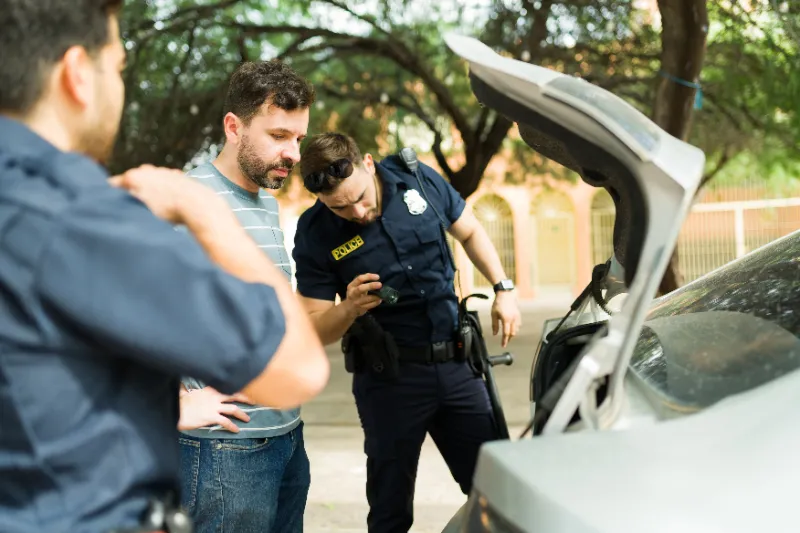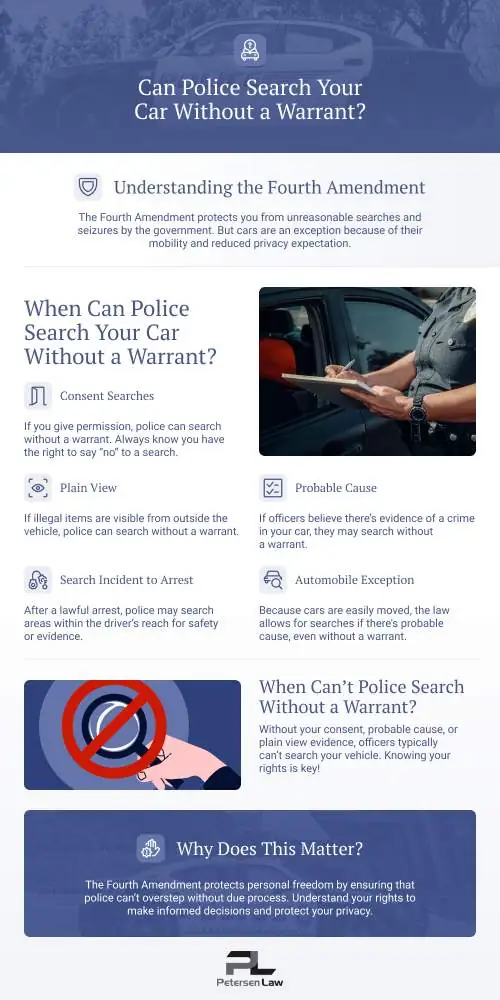
Have you ever been pulled over and worried about the outcome of an officer searching your car? You’re not alone. Many drivers in Nebraska are unsure of their rights regarding car searches. You may wonder, Do police need a warrant to search your car?
The good news is that federal and state laws protect you from unreasonable searches and seizures. But what does that mean for car searches in Nebraska? Today, we’ll look at when police can and cannot search your car without a warrant.

When Can the Police Search Your Car?
The short answer to this question is: it depends. The Fourth Amendment of the United States Constitution and Article I-7 of the Nebraska Constitution protects citizens from unlawful seizures and searches. Still, these protections are balanced against the state’s interest in law enforcement and public safety.
Under federal and Nebraska law, your vehicle does not have the same privacy safeguards as your house. This means that, under certain instances, police may search your car without a warrant.
Can Police Search Your Car Without a Warrant?
Let’s look at some key scenarios when police can search your car without a warrant.
Consent
This is the most common exception. If you give the officer explicit permission to search your vehicle, they can do so legally. However, it’s essential to understand that consent must be freely and voluntarily given. If you feel pressured or coerced, your consent might not be valid. If so, your lawyer could seek to invalidate the search and exclude any evidence found as a result of the illegal search.
Probable Cause
Probable cause to search your car exists when an officer reasonably believes that evidence of a crime is present. This belief must be based on specific facts and observations, not just a hunch. For example, if the officer detects the smell of marijuana coming from your car, that could provide probable cause for a search.
Plain View
If the officer sees evidence of a crime in plain view from a lawful vantage point (like during a traffic stop), they can seize that evidence and potentially search further based on it. For example, if they see a bag of drugs on your passenger seat, they can seize the bag and potentially search the car for more evidence.
Search Incident to Arrest
Following a lawful arrest, the officer can search your car and the surrounding area for weapons that could be used to harm them or aid in your escape.
Automobile Exception
This exception allows warrantless searches of readily mobile vehicles under specific circumstances. For instance, if the police have probable cause to believe your car contains evidence of a crime and the car is mobile (not parked at your home), they could search it without a warrant.
These examples highlight the diverse exceptions to the warrant requirement for car searches. Nebraska law is complex, and the specifics of your situation can significantly impact whether a search is legal. If you believe your car was searched illegally, it’s crucial to consult with an experienced lawyer who knows how to challenge the search and seizure of any evidence.
Can Police Track Your Car Without a Warrant?
Generally, no. Police need a warrant to track the movements of your car using GPS technology. However, there are exceptions, such as exigent circumstances where there’s a risk of imminent harm or danger.
Can Police Impound Your Car Without a Warrant?
Yes, police can impound your car without a warrant under specific circumstances, including:
- The vehicle is parked illegally and obstructing traffic;
- The car is unsafe to operate (e.g., due to a flat tire or malfunctioning brakes); or
- The driver is arrested for a DUI or other offense that renders them unable to drive legally.
However, if the impoundment seems unrelated to any legitimate public safety concern or traffic violation, it might be considered an unreasonable seizure.
Know Your Rights and Protect Yourself with Petersen Criminal Defense Law.
Understanding your rights regarding car searches and interactions with law enforcement is crucial. If you’re unsure about a situation, it’s always best to politely decline a search and request to speak with an attorney.
For knowledgeable legal assistance and guidance on car search issues or rights violations, turn to Petersen Criminal Defense Law. Our trusted firm has handled over 6,000 criminal defense cases since 1995. Our team of dedicated attorneys understands the stress and confusion that can arise from experiencing an unreasonable search.
Take the first step in protecting your rights. Contact us to schedule a confidential initial consultation today and explore your legal options.


